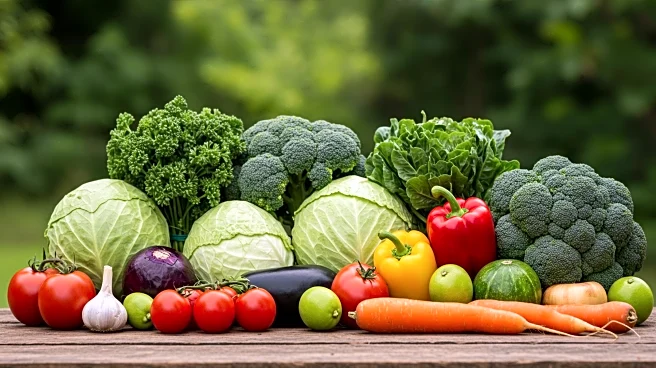What's Happening?
Recent data indicates a significant 38% increase in the wholesale price of vegetables in July, raising concerns about potential impacts on consumer prices. This surge is the largest for any product category and has sparked debate among economists regarding its causes. Some analysts suggest that President Trump's tariffs could be contributing to the price hike, as importers often pass on the tax burden to consumers. However, other factors such as adverse weather conditions and supply chain disruptions are also being considered as possible reasons for the increase. The U.S. imports over a third of its fresh vegetables, making this sector particularly vulnerable to tariff-induced price changes. Despite the wholesale price surge, consumer vegetable prices remained stable from June to July.
Why It's Important?
The increase in wholesale vegetable prices could have significant implications for both consumers and businesses. If the trend continues, consumers may face higher prices at grocery stores and restaurants, affecting household budgets. Businesses, particularly those in the food industry, could see increased costs, potentially impacting their profitability. The situation also highlights the broader economic impact of tariffs, which have been a contentious issue in U.S. trade policy. While some argue that tariffs bring revenue into the Treasury, others point out the potential for increased costs to be passed on to consumers. The debate underscores the complexity of trade policies and their far-reaching effects on the economy.
What's Next?
If the current trend in wholesale prices persists, consumers could start seeing noticeable price increases in the coming months. Analysts predict that consumer price hikes could exceed 10% if the wholesale surge continues. Businesses may need to adjust their pricing strategies to accommodate rising costs, potentially leading to further economic implications. The situation will likely prompt continued scrutiny of tariff policies and their impact on the economy. Stakeholders, including policymakers and industry leaders, may need to consider measures to mitigate the effects of rising prices on consumers and businesses.
Beyond the Headlines
The rise in wholesale vegetable prices also brings attention to the role of immigration policies in the agricultural sector. With a significant portion of agricultural workers being non-citizen immigrants, restrictive immigration policies could exacerbate labor shortages, driving up wages and, consequently, prices. This aspect adds another layer to the economic challenges faced by the agricultural industry and highlights the interconnectedness of trade, immigration, and economic policies.











